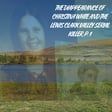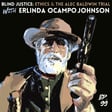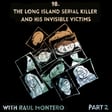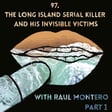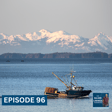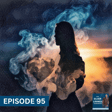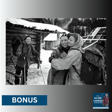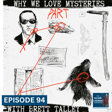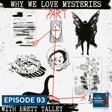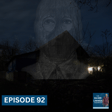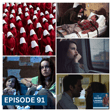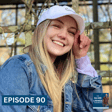Become a Creator today!Start creating today - Share your story with the world!
Start for free
00:00:00
00:00:01

54. Survivor: The Story of Nada Fronk and Missing and Murdered Indigenous Women with Monte Fronk
Join us on a journey to the heart of the Mille Lacs Band of Ojibwe, where Monte Fronk, a tribal first responder, opens up about the painful loss of his daughter, Nada, and the ongoing struggle of indigenous communities against a backdrop of violence and neglect. As we discuss the history and impact of the missing and murdered indigenous people, Monte’s powerful narrative is a sobering reminder of the deep-rooted issues facing Native American communities and the urgent need for awareness and action.
Learn more by visiting our website and follow along with us on Instagram.
Join our Silver Linings Fireside Chat Facebook group and join us on Patreon.
Transcript
The Pain of Burying a Child
00:00:00
Speaker
I think we will always keep fighting to find our loved ones. And when this happens, even in my story, I would have rather had, and many people did, come to me and say, Monty, I don't know what to say.
00:00:25
Speaker
And I tell them that's what I rather hear than I'm sorry, or sorry for your loss. I rather have them say, honestly, I don't know what to say. But I do know that for all of us in Indian country who have buried our children, we know that
00:00:53
Speaker
a big part of us dies with our child. And I know I will never be the same Monty from May 26, two years ago, because we are not meant to bury our children before us. And that's what I live with, is people will never understand that unless
00:01:23
Speaker
They have buried the child.
Advocacy in the Missing and Murdered Indigenous Women's Movement
00:01:43
Speaker
That's Monty Awon Frank, a member of the Ojibwe tribe who lives in the Mille Lacs Indian Reservation in East Central Minnesota. At a time when a day doesn't go by where a native woman goes missing or is murdered in the United States or Canada, Monty stands out as a strong man who has dedicated himself to what's called the Missing and Murdered Indigenous Women's Movement.
00:02:11
Speaker
Missing and murdered indigenous people is not new. It's been going on for centuries since Christopher Columbus came to the shores of Cuba and decimated the indigenous populations. It has continued through colonization and it continues today.
00:02:29
Speaker
The Missing and Murdered Indigenous Women's Movement, however, is dedicated to finally bringing awareness to the specific area of ongoing tragedies that have ravaged generations of Native families and communities. Monte is a part of the mukwa clan of the Nalax Band of Ojibwe. He works as a tribal first responder and advocate, and he's the father of a young Indigenous woman, Native Franc.
00:02:56
Speaker
who was sex trafficked after going missing several times between the ages of 14 and 16. Nada had just begun to get her life on track when she was murdered on May 26, 2021, at the young age of 24 years old.
Violence Against Native American Women: A Crisis
00:03:14
Speaker
No one knows how many Indigenous people have gone missing or been murdered in the United States and Canada. The US Bureau of Indian Affairs estimates that there are 4,200 unsolved cases
00:03:26
Speaker
but the actual numbers are likely to be much higher in an epidemic that advocates say stretches back to colonialism. The reasons for the underreporting vary from misclassification to a lack of a comprehensive federal database. But that doesn't answer why in places like Minnesota, American Indian women and girls make up 1% of the population, but they're 8% of the ones who are murdered.
00:03:55
Speaker
Native women are twice as likely in the United States to experience violence than any other demographic. One in three indigenous women is sexually assaulted during her lifetime. Native women are 20% more likely to experience a lifetime of violence, two times as many native women are likely to be victims at some point. To be born a Native American woman is to exponentially increase your likelihood of early death or trauma,
00:04:25
Speaker
Indigenous women are murdered 10 times higher than all other ethnicities.
Monty's Role in State Advisory for Indigenous Relatives
00:04:31
Speaker
Monte serves as the chair of the Advisory Council for the Minnesota Missing and Murdered Indigenous Relatives Office, where he focuses on advising, consulting, and making recommendations to state officials.
00:04:44
Speaker
Today, as a renewed push has begun among some federal state to deal with the challenge of missing and murdered natives, we're going to discuss the history, the causes, and challenges related to these problems and what can be truly done to address these and other challenges for Native American people and communities, both on and off reservations. Normally, this is where I would dive right into the story.
00:05:12
Speaker
But Monty and I both feel it'd be important to tell Nadia's story. So to honor her and inform you, I'm going to do something I don't normally do and tell her story in a narrative form.
Nada's Challenges and Tragic End
00:05:31
Speaker
Nada was born on a bone-chillingly cold day in January, 1996. Nada
00:05:40
Speaker
is a member of the Legion Lake Band of Ojibwe, and she was placed in foster care soon after her birth. Monty remembers first seeing Nada and her sister dressed in ragged clothes, sleeping in a closet on his first visit to the foster home. Nada was nine years old when Monty and his wife Jen adopted both girls.
00:06:03
Speaker
Monty remembers the drive to take the girls to the family's home in the tiny lakeside town of Isle. Soon after Nada was adopted, it became clear to Jen and Monty that she was suffering from the symptoms of fetal alcohol spectrum disorder, a group of conditions that can create learning and behavioral problems, such as difficulty managing emotions and poor impulse control.
00:06:32
Speaker
At one moment, Monty says, Nada threatened to hang herself. At other times, he said, the police had to be called. Soon, Monty and Jen made the gut wrenching decision to place Nada in out-of-home care. Nada bounced from placement to placement and began to run away during her teenage years. It was just for a few days at first. Then the stretches grew longer and longer.
00:07:00
Speaker
In 2013, she vanished without a trace. Months passed and nothing turned up. Monty's contacts and law enforcement found nothing at all. Monty says Native social worker did little to help because, as he said, they were, quote, just a Native family.
00:07:22
Speaker
One day, during a long stretch where Nada was missing, Monty received a call from law enforcement authorities who had begun detecting pictures of Nada circulating on adult websites where men bought sex. Later, after Nada was placed in a group home for young women, she began attending high school again,
00:07:44
Speaker
It was then she opened up to law enforcement about how she had been physically and sexually assaulted, sexually exploited, and trafficked. She said her biological mother's boyfriend had sold both her and her biological mother to sex traffickers. The case was referred to the St. Paul, Minnesota police, who now have no record of the case being investigated. A couple months later, after making her report,
00:08:14
Speaker
Nada ran away again. This time, it took a few weeks to find her. But later, Nada would find a great amount of stability and begin to rebuild her life. She met a man at work, got engaged, and fantasized about the future. They broke up, however, because Nada was having difficulty, unsurprisingly, with trust. Soon she began dating another man. And on May 26, 2021,
00:08:44
Speaker
Shots rang out in an apartment complex in Minnesota. The rounds tore through several apartment walls. As the police evacuated the building, no one answered in apartment 103. The door was blocked by several items. The police put a camera through a crack in the door and saw two bodies. One was Nada and one was her boyfriend who had killed her in a murder-suicide.
Jason's Journey to Understanding Indian Country
00:09:28
Speaker
Hey, Monty. I just wanted to thank you for joining me, give you a little background on my interest in this topic, super important topic that, you know, I am a person who grew up, you know, middle class, got a great education.
00:09:47
Speaker
But I never really understood until I became a reporter at the New York Times, like the true sort of state of what was happening in Indian country. And there was one real key inflection point. I began mentoring a woman who was native from the state of Washington.
00:10:08
Speaker
And she was the first person, she was a journalism student in college, who really exposed me to some of the poverty, some of the challenges that happened in Native communities. And the current impact that sort of we as Americans, as an American country, were
00:10:29
Speaker
were landing on them. And that put the issues of all sorts of issues on my radar screen, including not the least of which was missing and murdered women. And recently, I've been talking to a friend of mine who is Ojibwe from Minnesota about how important it is to tell this story and have more people
00:10:53
Speaker
I think understand the reality so I was grateful when I tripped across your story in newspapers because I really thought that you're you sound like you're an important voice to the whole conversation so thank you for coming on. Well you know Jason it's a real honor to be asked you just never know where.
00:11:15
Speaker
a story will lead or whose mind or body or spirit will find the story.
00:11:24
Speaker
And here we are, you and I sitting together, talking about this, as we say, you know, this epidemic of missing and murdered indigenous relatives. And just how I always start any story, as Ojibwe people, we have to introduce ourselves in our traditional way, which is, I will say, Bozoo, a want in the Hindu gods, Monty Frank, indigo,
00:11:51
Speaker
Malax in Dujoba, Chaminasing in Da, Iwadi-Tribal Emergency Management, and Mako Dudum. In English, that just says, Bozoo means hello. My traditional Ojibwe name is Awan, which means the fog. I'm here within the Malax Band of Ojibwe.
00:12:14
Speaker
I live in the Chaminissing district and Chaminissing means people of the island or in the little community of Isle, Minnesota. And I do emergency management for the Mille Lacs Band. And mukwa is the clan I belong to, which is the clan of the bear.
00:12:33
Speaker
And traditionally, that role was either a medicine person or a protector. So my job and travel public safety definitely has followed where that clan has led me
Resilience of the Ojibwe People
00:12:45
Speaker
to. Follows your family history.
00:12:49
Speaker
People who don't really know a lot about the sort of journey of the Ojibwe and, you know, the tribes in general, we were talking off, Mike, you were saying there, is it 535? No, actually there are, you know, right now within the boundaries of the United States, there are 580 federally recognized tribes.
00:13:16
Speaker
And we had to realize that when first contact happened, you know, there were millions of indigenous people who called this land home.
00:13:26
Speaker
And through, you know, first contact and federal Indian policies and, you know, in one word genocide, you know, we are now down to 580 federally recognized tribes in the United States. Plus wanting to recognize we have very large urban populations also, uh, due to relocation policies in the 1950s.
00:13:52
Speaker
Right, right. Yeah, I was recently reading for the second time the book Yellowbird. Have you have you read that book? I have. I have not read it, but I've heard about it.
00:14:03
Speaker
Yeah, right. And one of the really interesting parts about it in the beginning of the book, they talk a little bit about not a little bit. They talk about a lot of, you know, one of the big things that happened in that area was there was a river and there was a project to sort of adjust the flow of the river, but it flooded out a significant point of part of the reservation. Three hundred families had to be
00:14:30
Speaker
relocated because of it. They offered jobs to some of the people who were displaced all over the country in different, and this was happening in the 1950s, in different places. And it made me think as I was looking at it, that, you know, I think through a lot of my life, I've looked at what's happened to natives
00:14:51
Speaker
in America through the lens of this American exceptionalism, this idea that we have to assimilate other cultures into our culture and that we don't really respect diversity. As somebody who's an African-American, I kind of get that and feel that vibe at times. But when I was reading those stories about the relocations,
00:15:17
Speaker
I felt as if it wasn't really about assimilation, but it was about wiping out a culture. Many of our policies were driven in that direction. Well, you know, most every federal Indian policy really from
Impact of Federal Policies on Native Communities
00:15:34
Speaker
first contact was designed to basically, you know, to exterminate the native populations that, you know, European society encountered.
00:15:47
Speaker
because they wanted the natural resources of the lands and, you know, who was in the way. All the native people who called, you know, this Mother Earth home. And so, you know, there are so many federal ending policies from, you know, first contact from, you know, treaty times in the 1800s
00:16:12
Speaker
Then you talked about the assimilation times, and that was the boarding schools that were going from the 1800s into the early 1970s. And then you talked about the relocation programs, and those were in the mid-50s, and many of my relatives ended up on the West Coast in Los Angeles.
00:16:33
Speaker
in the 1950s because they were supposedly promised a better life and a one-way ticket and no way home.
00:16:44
Speaker
And then it came into the termination period where the United States realized they could not maintain, keep funding all these tribes and certain tribes were just terminated. And in the Midwest region, the Menominee Nation was a prime example that was terminated. One day you are a recognized sovereign nation and next day you weren't.
00:17:12
Speaker
And Aida Deere, who had just passed away here, was just a woman warrior who just fought tooth and nail and was able to get the federal recognition back. But we always say when our elders tell us these stories about all these federal Indian policies and what they lead into, which we call historical trauma.
00:17:38
Speaker
And every story elders I've listened to in talking circles and gatherings have always shared that for every federal Indian policy placed upon the entire indigenous population of the United States, it will take seven generations to heal from every single federal Indian policy.
00:18:04
Speaker
And that those traumas are genetically passed from mother to children. So we call this our blood memory. So those traumas of our grandparents and great and great grandparents are always within us.
00:18:22
Speaker
And so many of us, including myself, we will travel into the spirit world without ever overcoming all those traumas that are genetically within us from first contact until right now we're in 2024 now.
Intergenerational Trauma and Historical Injustices
00:18:41
Speaker
Yeah, and one of the things that I think I've learned over the years that was really fascinating, because I think a lot of this research has been done on indigenous populations and by indigenous scholars. But one of the things that's been sort of super clear to me, and I think Maria Braveheart, who is a
00:19:07
Speaker
sociologist who works at the University of New Mexico. And she, she identified and explored this concept of intergenerational trauma, that trauma is passed on from generation to generation to generation, exactly the effects today.
00:19:25
Speaker
But at the same time researchers on the biological side discovered that trauma actually changes your dna. Yes it does that to me was just a in thinking of the native american.
00:19:40
Speaker
and the native experience and all of North America and South America, that was kind of a frightening idea because, you know, today you have a lot of people, including some justices on our Supreme Court, who really believe we've gotten to the point where providing affirmative help to anyone is discrimination. But I keep on thinking to myself, what amount of affirmative help is going to make up
00:20:10
Speaker
for generations and generations and generations of trauma. You know, and that is a story that we have heard across Indian country. And right now, you might have read also of that Secretary Haaland has been traveling across Indian country having hearings on boarding schools.
Significance of Native American Leadership in Government
00:20:32
Speaker
Yep. That's Deb Holland, who's the first native cabinet secretary. Yes, yes. And we were so honored. And in fact, she had actually came to the Mille Lacs Band of Ojibwe to host one of her listing sessions for boarding school survivors. And I had I was able to attend and just to my
00:20:57
Speaker
I mean, honor or surprise, not only do we have Deb Haaland, but we had our Lieutenant Governor of Minnesota, Lieutenant Peggy Flanagan, who was the highest ranking elected native woman in the entire United States. And I was just listening to the boarding school story since I'm second generation from a boarding school survivor on my grandmother and also on my father.
00:21:26
Speaker
But to my surprise, these two strong indigenous women came up to me and just came up to me and just expressed their sorrow of my daughter's story.
00:21:48
Speaker
And here is the Secretary of Interior, the highest Native woman put into office and the highest elected official who just came to me as strong Indigenous women and just showed their support and care and compassion of being a father of a
00:22:18
Speaker
daughter who was human trafficked and murdered at age 24. And that showed exactly how they are as indigenous women, their strength and their passion to leave what they were there for and come to me in that way. As someone who's here,
00:22:45
Speaker
As someone who's indigenous, did you ever imagine the day where you'd be sitting in front of a cabinet secretary who was native? Well, you know, as I got to tell her is in BIA history in the early 1970s, a group of native men called the Furious 14
00:23:14
Speaker
went out and tried to change the Bureau of Indian Affairs. And my father Lee Cook was one of them. And the bureaucracy was so embedded that these furious 14 native men who went out to change the BIA just couldn't accomplish that.
00:23:39
Speaker
And my father's wish was one he would always hope to see a native person who was the secretary of interior. And, and even though, you know, he passed away two years ago of complications with COVID, but also he had, he would get him severe, well, severe Alzheimer's also.
00:24:04
Speaker
but he was still well enough to watch his dream come true.
00:24:11
Speaker
Oh, that's. And have you ever have you ever heard of the Maya Angelou poem still I rise? There's this line that's so powerful, at least for I think for me and a lot of people. But where she says bringing the gifts that my ancestors gave, I am the dream and the hope of a slave. And it's almost like Deb Holland is sort of the dream and the hope of your ancestors.
00:24:41
Speaker
You know, and that is something which I got to tell her. That's awesome. Yeah, it was.
Honoring Nada's Story and Memory
00:24:49
Speaker
And to just look at her and just tell her, you know, to tell her, you're my father's dream. He could not accomplish this with other Native men going to D.C. in the early 70s. And he always wished he would see this day. And he did before he passed.
00:25:11
Speaker
And I was so honored to tell her that because I've heard his stories of what he tried to do but couldn't. And this was his hope before he would travel on the spirit world. And he was able to see that. It's just amazing to think that the woman who's running that department responsible for all
00:25:37
Speaker
Native affairs, at least for the American government, is finally a Native. And it's kind of crazy to think that we've never even really had high-ranking people on that role. You mentioned your daughter, Nada, who went missing several times and was eventually murdered.
00:25:59
Speaker
I remember reading in her obituary, it talked about how her name meant she's a fierce, passionate woman. And certainly in reading about her, it sounded like she was. And there was this line in there where you said that she was young, beautiful, and wise.
00:26:17
Speaker
beyond her years. And I'm just curious, like, you know, so many times we spend so much time on how people die, and we don't spend time on how they live. What was she like? You know, you know, in her short life, and as you said, you know, so passionately, you know, you know, her
00:26:45
Speaker
Ojibwe name was so fitting because through the traumas that she lived through. And like in my story, she also had a diagnosis of second generational fetal alcohol syndrome.
00:27:07
Speaker
And what I've learned is that there are probably so many other young adults who are probably undiagnosed with that same disorder.
00:27:23
Speaker
which causes them to struggle in their life with relationships, careers, education, behavioral health, chemical dependency, and unfortunately, it can lead them into being human trafficked.
00:27:41
Speaker
And i know nada was some very vulnerable essentially to other people i wouldn't say i wouldn't say vulnerable but the big thing that they do not have this impulse control. Which could lead them into unsafe situations or you know when i've talked to other advocates it's like the bling at the moment attracts them.
00:28:10
Speaker
because they don't have that impulse control to say no or stop. And unfortunately, they will never have that. And there's no cure for this.
00:28:25
Speaker
and sort of like that filter in our brain that the bright shiny object in front of us is not necessarily as good for us as we think because it's the same thing that, I think it can almost be a positive quality at times where people who are very impulsive can take the world with reckless abandon, but it can also be very dangerous for them
00:28:55
Speaker
And for her, she was such strong and resilient that she never liked when we have to remind that she had that diagnosis.
00:29:14
Speaker
You know, and she at times would just tell us, you know, I understand my brain doesn't always work as well as others, but she never, she never liked.
00:29:27
Speaker
having like that title over her with that and she really, you know, she lived, she always did. She, she, you know, she tried to live her life every day as, as herself, as her strong indigenous self.
Unconditional Love and Resilience
00:29:49
Speaker
She had
00:29:50
Speaker
She had wishes, she had dreams, she had goals she would like to do with that. But unfortunately, that issue and a lot of other traumas that were going in her life, she just couldn't control those. What did you love the most about her? What I loved most about my daughter
00:30:20
Speaker
is especially as she got older, just that teenage snarkiness that a lot of us who are indigenous parents will know exactly what I'm talking about. And it was one of those things that
00:30:40
Speaker
You know, in our household would definitely would cause issues between myself and her mother wise because it would, I was like, I'm like, bring it on girl. Yeah, exactly. Cause I just thought this is so.
00:30:57
Speaker
age appropriate for teenage, native, young, strong, passionate young woman, you know, just testing those boundaries and seeing what we as, as your parents were going to do or taking things. And that and that's what I remember it just, you know, it was, you know, some nights you just
00:31:21
Speaker
it just was like tiring but i look back and those are the moments i just look back and say you know that was my nato now that was my girl just just strong passionate snarky and just so appropriate for her age.
00:31:40
Speaker
I remember talking to my partner about this, or my former partner about this at one point, where I was like, this is how kids test our love sometimes. They push the limits and test the limits, and we are still there. And we still love them just as much as before that snarky comment or that wild thing they did. And it was probably really important to her
00:32:06
Speaker
as somebody who grew up in foster care, before you, to know that she was loved. And it sounds like loved unconditionally. You know, and when I hear how you put it in your words, it goes back to part of her story. And that was when she turned 20 years old and
00:32:31
Speaker
We had dinner together to celebrate, and my beautiful girl was such a foodie. She liked different food venues and liked trying things, and he went out to a Brazilian steakhouse and just had one of those truly remarkable father-daughter... That's the one that'll bring you the meat on...
00:32:52
Speaker
Oh yeah. Oh yeah. Over and over. Oh, you just gorge yourself. But, you know, but as a father and her 20 and a 20 year old daughter, we had one of those magical moments where we just talk life, talk what her hopes were, what her dreams were, you know, what she's, you know, where her path has taken her.
00:33:19
Speaker
And as we were leaving, and I always tell this when I'm asked to tell her story, you know, and we're about to leave. And my beautiful girl just looked at me, you know, and said, Dad, I want to tell you one more thing. And she looked at me with those beautiful eyes of hers. And she just says, you know, Dad, the only reason that I am alive
00:33:50
Speaker
is because of you. Because everything I did for you to give up on me, you never did. And so you did show her unconditional love. She saw it.
00:34:08
Speaker
Well, sometimes actions speak louder than words. And that was one of those, and we hugged, and it was just one of those beautiful moments that note that what her life had been through. And for me as her father was just one of the things I will never forget. And I will always tell the story.
00:34:37
Speaker
Vivid, vivid memory. Can you still, let's see, she was 2021 in March. Can you still in your mind hear her voice and imagine her with you? Well, the one thing in our traditional Ojibwe funeral practices is we have to let our loved ones go.
Ojibwe Traditions and Spiritual Beliefs
00:35:04
Speaker
The stories that we were given about when our spirit passes is we have to let our loved ones go. They're going to a place that we call in our Ojibwe world, the place of everlasting happiness. And if their spirit knows that we're still grieving, they're going to want to come back
00:35:33
Speaker
And so we're told in our stories that once they're sent off, we have to let our loved ones go. And it's one of the unique things that when all my brothers and sisters in fire in EMS and emergency management showed up to support my darkest day for our traditional wake and funeral.
00:35:58
Speaker
That's the one thing all of them said that was the amazing part of the story because in most societies we hang on and we grieve for years and years and we can't let things go. And in your traditional way, you have to do that for her or she won't be happy where she's going.
00:36:25
Speaker
And like, you know, in your story of covering 9-11, you know, I went to work following the next day following her funeral. And many people were like, what are you doing at work?
00:36:44
Speaker
And I said, where else would I be? And like, you should be home grieving. And I said, not how we do things as Ojibwe people. We, everything spiritually was done for her. She's in a place where she's meeting, meeting all her relatives from thousands of years, you know?
00:37:08
Speaker
And now that my father passed, I'm hoping those two met each other now up there and they're both are happy together again. Yeah, I had an interesting experience last year. My mom, she got sick and she'd been sick for years, but it was clearly getting worse.
00:37:29
Speaker
My partner, who I had mentioned before, had gone in to visit her, and my mom was singing an old African American hymn, and she asked her, do you know this song?
00:37:39
Speaker
And she said, no. And my mom said that it is a hymn about going home to God in heaven. And my mom said, I can't wait, but just not today. And I took a cue from that when she actually passed away. And if you can believe this, there were three sisters left on her side of the family. My mom passed away on October 27th. Nine days later, her younger sister passed away.
00:38:07
Speaker
nine days later, the oldest sister passed away. That whole generation was gone. And I had thought when my mom died that I would be grieving and in tears for years. And what I found was, and this is going to sound crazy to people possibly, but I had such gratitude for having her in my life. And I have over time
00:38:35
Speaker
begun to sort of love this thing that I hate happened because in moments like this, Monty, when I'm having this conversation with you, I understand your loss more deeply. I understand also that reason why you have to let go, to grow, to move on, to take that person's gifts and
00:39:01
Speaker
insert them into the world. I know it's not typical of American culture, but I certainly find what you're saying quite relatable for me right now. I think there are many cultures who have similar teachings. You mentioned in your stories, there's many communities, I think, who are so culturally rich and who have those similar teachings about
00:39:31
Speaker
you know, respect for elders and, you know, going into the next world, whatever they would call that, you know, and I think there's many, many cultures that follow similar things and it makes us who are still here, you know, know that they're in a good place. They're happy where they're at. You know, they want us to be happy, you know, and
00:39:59
Speaker
You know, my uncle Herb Sam always told this story that, you know, he was one of our, one of our, one of our traditional healers here. And he always said when that, when the sun is setting and it's just a little sliver left, if you look really hard, you'll see all of our relatives who have passed dancing and are happy at that moment. That's a powerful, powerful image.
00:40:29
Speaker
I know you adopted Nada when she was nine years old and she moved in, lived with you guys.
Systemic Failures in Native Childcare
00:40:38
Speaker
But eventually, because of the syndrome, she had to go into out-of-home placement. And you had mentioned, or you had talked to me about, and you've talked publicly about the fact that she went from placement to placement to placement.
00:40:55
Speaker
And even during those times where she went missing, which I definitely ask you about, she went missing. You didn't get a lot of help from the social workers, the state social worker. And I think there was one time you were quoted as saying something along the lines of that you thought it was just because she was a native child. And in a lot of ways, it sounds like, and there was another example where
00:41:22
Speaker
when she opened up about the things that had happened to her when she was sex trafficked, you know, the St. Paul, Minnesota police had received the report, but there's no evidence of an investigation. It seems like a lot of the systems that people believe exist to protect all of us and to protect Native people failed her.
00:41:47
Speaker
And that's when we think about that, the story you just said.
00:41:54
Speaker
You know, this has been going on since first contact. You look at the assimilation of boarding schools. It was the same type of thing, of systems who were trying to- They were trying to push in border schools. Yep, yep. As they say, you know, kill the Indian and save the man. And this is why in our history,
00:42:21
Speaker
That the indian child welfare act came into being because so many of our native children were basically scooped up stolen or everyone want to call it.
00:42:35
Speaker
and adopted out or given away to non-Native families, figuring they're in a better situation.
Protecting Native Children from Cultural Removal
00:42:46
Speaker
That's the law that the Supreme Court just upheld, that Native children, the first
00:42:55
Speaker
opportunity for adoption is given to other Native families, right? Well, yeah, you know, is exactly right. Or, you know, or if there is a situation where the care of the children may be temporarily, you know, there's issues in the home with the caregivers.
00:43:14
Speaker
then that child will stay within that tribal nation and try to find extended family or other relatives who could take them in for a time being with that one or another indigenous family possibly also because it was trying to maintain that sense of family. It was trying to maintain the culture for this child
00:43:39
Speaker
Because of that whole 1960s adoption process that were going out in Canada and everywhere else, it was just to remove Indian children from reservations and give them to non-Native families who thought could raise them better.
00:43:58
Speaker
And it left so many kids with trauma and scarring of loss of identity, not knowing who they were. And so, yeah, it was definitely one with that. And fortunately, as I said before, many times those systems of
00:44:25
Speaker
you know, foster care systems or social work systems that have to oversee, you know, native families, you know, unfortunately had a history of just, you know, very implied bias case management. And it's basically that, you know, um, like in our story,
00:44:53
Speaker
you know, is that we saw systems who just saw our household as just a, oh, it's just one of those native families.
00:45:08
Speaker
And it didn't matter that, you know, that I was in tribal public safety for over 20 years and have a master's degree and many fire and EMS certifications to do what I do, you know, well in my community, you know, her mother had had a four year degree. It didn't matter.
00:45:30
Speaker
The only thing that was seen was what was on the outside. And if you think about other cases, if this had been, let's say a white suburban kid, well-off family disappears, I think it would be front page news,
Media Disparities in Missing Persons Cases
00:45:49
Speaker
right? Well, actually it was. If you remember at the same time of my daughter's murder, there was a prominent young
00:45:58
Speaker
you know, non-native woman who went missing in Utah. And that case got two weeks of 24-7 coverage. It got the FBI involvement. It got all this press and media and attention. And when my nada got murdered, her 24 years of life
00:46:26
Speaker
was only worth nine and a half minutes of media time. And it was just, number one, showing the 911 call of the murder and then when she was identified as the victim.
00:46:48
Speaker
Sort of like a metaphor for the way that she was treated. Yeah, yeah, exactly right. And unfortunately, that is a story all across Indian country, not just my daughter's story.
00:47:02
Speaker
You know, there are so many indigenous families across, you know, the 580 tribes, the large urban populations that have the same story, that our native lives are not worth the time as others. You once said, you know,
00:47:32
Speaker
And I mean, I think part of that, part of the difficulty there is native communities need the support of the federal government in part because there's not real sovereignty. But if the federal government and the state governments don't truly provide that support, it creates this gap. And it reminds me of something you once said. I read this quote where you had said that found and alive
00:48:01
Speaker
is something that is rarely heard of when it comes to missing natives. Yes, but also in your statement about tribal sovereignty. It is something that, you know, that tribal nations hold dearly because we are a nation within a nation.
00:48:29
Speaker
And it is the strongest identification we have as Native people, as our sovereignty. And with the treaties that were signed in the 1800s, you know, that the federal government, you know, always has a treaty and trust responsibility to all 580 federally recognized tribes.
00:48:56
Speaker
And that is something that we have seen under the current administration making really strong strives to try to meet the wrongs that were done by previous administrations.
00:49:12
Speaker
What does that look like?
Federal Efforts on Missing and Murdered Indigenous Women
00:49:14
Speaker
You know, I mean, in, for example, in this epidemic of missing and murdered indigenous relatives, you know, we are seeing now under Secretary Deb Haaland of her creating the missing and murdered unit under the Birbin Affairs Law Enforcement Services.
00:49:36
Speaker
We are seeing under, we're seeing dedicated FBI assigned to missing and murdered indigenous relative cases. We are seeing Department of Justice units being created who focus on missing and murdered indigenous women and relatives all over the United States with that one. So we are seeing that commitment being put forward by the federal government now.
00:50:06
Speaker
And they know this epidemic is so large and has been going on for so long that they know they're coming up late in the game in the process.
00:50:22
Speaker
where, you know, this has been, you know, our indigenous women, you know, our grandmothers, our mothers. This country. Exactly. Exactly. And, and, and for those who, if you're self included, if you went to the killers of the flower move, you know, flower flower movie, you know, but the whole old sage names. Yeah. And you just truly saw how,
00:50:52
Speaker
worthless indigenous lives meant watching that movie. And it's not an exaggeration compared to the reality, certainly if you've read the book or the articles on it. I had a friend who asked me, was that played up a little bit? And I was like, no, no, no, no. If anything, it was played down compared to what really happened.
00:51:16
Speaker
When you talk about those changes that have happened, Monte, do you think those changes are permanent and here to stay? Or do you think that a shift in the political winds could take us back to the place that we've been in?
00:51:37
Speaker
Well, let's go back to your previous question before we get into the tribal sovereignty. You quoted me, and I want to go back to that, please. The one where you had said, I think I was talking about the one where you said that recovered alive is almost unheard of. And that was when I was asked to be on a federal panel talking about this epidemic.
00:52:08
Speaker
And when I explained to this national federal policy board that I was able to recover my daughter alive. And this is before she had died or this, right? Yep. Yep. Yep. And you know, you could have heard a pin drop and finally one of
00:52:37
Speaker
the people on that board, on that national listening group said, you know, do you know how rare and you know, that is because all they hear is stories of our relatives who are missing, presumed murdered,
00:53:05
Speaker
and never found. And that's a journey in my story when I meet so many other native families who tell me how lucky I am because you know where your daughter is at.
00:53:34
Speaker
Even in their death. Which is right across from my house here in Chaminissing in the cemetery. Because they have been waiting 5, 10, 15, 20 years every day living and wondering where is their relative? Where is their sister? Where is their auntie? Where is their mother? And they may never get an answer.
00:54:03
Speaker
So it goes back to your current question about the resources today.
Resource Gaps for Native Families
00:54:11
Speaker
And that is one thing which I tell a lot in my story is all the resources that are available to our native families in this epidemic, I didn't have.
00:54:29
Speaker
You know, what I had was the National Center for Missing and Exploited Children. I had the Patti Weddling Foundation here in Minnesota. That's the Jacob Weddling. Jacob Weddling. That's Patti's mother. He was a Minnesota boy who was kidnapped, as I recall. Yep. In fact, when I started my public safety career in October of 89, that's when Jacob went missing.
00:54:56
Speaker
And I can remember back then it was teletypes going off and we were getting teletyped that this had happened. And it's one of the things where, as I got to know Patty, the teller, that story, but that one, but that's all the resources I had. But one of my cousins said, you know, cause
00:55:25
Speaker
you have a fraternity that no other indigenous families have in this epidemic. And I'm like, fraternity, cause what do you mean? He said, you have a fraternity of public safety brothers and sisters. Hmm.
00:55:47
Speaker
And I never thought about it until that moment because I knew when Nada was on run, she was always going into the Minneapolis area.
00:56:03
Speaker
And every firefighter, fire station I knew, EMT ambulance service I knew were always like, Hey, my brother, give us your picture. We'll put it up in our, in our, you know, in our, in our station, in our ambulance garage, you know, we'll keep an eye out her for, for calls. And that's a gift that now
00:56:30
Speaker
what I have been through is truly there. And that is truly something where so many of our Indigenous families will never have. They get that first responder at the door.
00:56:49
Speaker
Whether he is or he or she is a be a law enforcement officer a tribal officer you know a county a county sheriff you know deputy possibly or maybe you they live in an urban area like it's a it's a large metropolitan you know law enforcement agency.
00:57:10
Speaker
And knowing that we are in a situation all across the United States, especially in Indian country, where we're short, we are so short staffed.
00:57:23
Speaker
And when you have, you know, one tribal officer patrolling hundreds of acres of land, you know, and they get 12 calls pending and you're calling to report your daughter, your son missing, where does it go in their priority list?
00:57:45
Speaker
due to assault and progress. Other things that could be higher crisis type calls that are going on. Acute. Yeah, acute calls. And so we have to understand what's happening out there with that one. So our families get, where will my report go? Will my report and my missing relatives be acted upon quickly?
00:58:15
Speaker
or will we put on a file and they'll get to it when they get to it. And that leads into some of the federal resources that are out there now. And the one
00:58:29
Speaker
especially with the new Missing and Murdered Unit with the Bureau of Inn Affairs. Now they have a 24-7 contact system. They have an app they can use. They have a QR code. You can go with your smartphone and access to put in your missing relative information right as quickly as possible.
00:58:56
Speaker
And that will get funneled into the right agent to hopefully start following up sooner with time. So there is some resources that are much improved for all of our native families, which in my story, I never had available.
00:59:12
Speaker
Right, right. So we have made progress. I remember, I was going to ask you first, I cannot remember how many times Nada went missing and I don't even know if you have that number, but I remember one of those times reading that Patti Wetterling, Jacob's mom, told you that the likelihood of her being found alive was minimal and that you should start planning
00:59:41
Speaker
her funeral. I'm just wondering what it felt like in that moment to hear those, those words while she was missing. Well, and in her, in her story is at about 16 years old, she was human trafficked between 14 and 16 is that she was being advertised through like back pages and other type of media.
Grim Realities for Families of Missing Natives
01:00:10
Speaker
And once all those resources offer being advertised went dormant and went quiet and there was nothing. And this was almost two years of no contact.
01:00:27
Speaker
So two years of no contact, but you knew she had been advertised. Right. Yep. So this was, yep. So basically after 16 for almost two years after that, there was nothing. And, and both human traffic investigators from Minneapolis and St. Paul, there was nothing in that type of, you know, back page media resources that, that she was seen in before.
01:00:57
Speaker
And that, I mean, and Patty was just, and she still is an amazing woman, what she has been through. And all the time she called me just to say, you know, how are you doing? And it was getting close to two years. And, and, and as you said in the story, I had to ask her, you know, and Patty was Patty and she was honest.
01:01:28
Speaker
from the heart. And she just said, you know, through our experiences, the chances of recovering, you know, native alive, you know, and was to the point of, I would tell you to start planning for a funeral. And from Patty, it meant so much because you know where it was coming from when she said that.
01:01:56
Speaker
Because her son was still missing and she just in her own way gave me the reality that I needed to hear.
01:02:13
Speaker
And I think sometimes it's so hard to hear those things because I think people think you cannot hold on to both hope and be realistic at the same time, but I really think you can be realistic and still also be hopeful.
01:02:34
Speaker
I'm curious for you, after that period where she was gone that long, was there ever a point where you had sort of given up hope or stopped searching or it became too painful for you and your wife? Well, I know that before that happened with Patty is there was a suburb called Columbia Heights, Minnesota,
01:02:59
Speaker
that had impounded a vehicle during a snow emergency. And while doing inventory, they found unfortunately the body of a young girl who was obviously died of exposure in the trunk of one of the vehicles. And I'm just at home watching the news hearing this and the way they're describing her, you know, the gender,
01:03:30
Speaker
Her hair just fit at that time, my daughter's looks of life. And I knew officers down in Columbia Heights and basically called them up.
01:03:47
Speaker
And I said, I just watched the news. I said, you know, my daughter has been missing for over a year. And the description of the young woman you found in that vehicle sounds like my daughter. Let me send you her photo. If it is, you know, I will come down and identify the body. And I'll tell you, Jason, that is the longest five minutes I have ever waited in my life.
01:04:18
Speaker
because you're just so hard, you're just waiting, you know, is it or isn't it, you know, and the officer came back, you know, and it's just like, well, Monty, we, you know, we went out there and you're just like, yeah, yeah. And it says, it's not your daughter. But then as a father, you think it's somebody else's, somebody else is going to get the worst
01:04:47
Speaker
news of their life eventually, that this is their daughter, you know. And again, that's what happened about the two-year park and that's when Patty Wertling then gave me the reality. What was it like to get that news about your daughter?
01:05:06
Speaker
of not being her or of being her. Or of it being her because, you know, in her story, she really pulled it together. It seemed like she had opened up about her trauma and she had begun to rebuild her life. And I imagine to some extent you and your wife had felt like we've gotten through the toughest parts or one of the toughest parts. You know, you are
01:05:36
Speaker
correct in that view and especially came in the fact that when she was recovered alive and Nada was so adamant, she never wanted the word rescued. She hated that word with a passion. Why?
01:06:06
Speaker
She, it made her feel that she was weak because her strength and her passion. So when I tell she survived, she survived on her own. And because of that, you know, she wanted to get her life going. And when she, you know, escape for strength.
01:06:33
Speaker
to know that she was a survivor and that she was because her, again, her Ojibwe name, a fierce, passionate woman, Awkwa-deezy Nishka Ishka did Ikwe was so her because she was determined to live her life in a good way. And on her own, she moved down to Minneapolis
01:07:02
Speaker
You know, she did not graduate high school, but she found a two-year college that offered an actual high school diploma program for young adults who did not finish their high school diploma.
Nada's Determination and Achievements
01:07:17
Speaker
And she did this on her own. Didn't ask for any help.
01:07:23
Speaker
And, and then be, you know, and, and I had planned to come down and she's independent very much so. And actually when she graduated, she didn't want us down there. And I'm like, well, I'm her father and I'm not going to miss this moment because in Indian country, finishing high school is still such a remarkable accomplishment.
01:07:49
Speaker
So I went down there and I thought, well, hopefully I can just, it'd be a big auditorium and I can sneak in the back and she would never see me. And here it was in a small classroom and I'm like, I have no chance. I'm caught. So I just thought, so I just stayed in the hallway and at an angle so she couldn't see me, but I saw her walk up.
01:08:17
Speaker
proud, strong, resilient, and get her high school diploma on her own. And I got a picture of that. And at the end, I went down to the reception area. I found the principal and I just said, hey, I'm Nate's father. She didn't want me here, but I did come. I have a traditional gift for her.
01:08:42
Speaker
you know, can you please give it to her? And and just tell her I was here. So I was heading back to Jimenez saying from from this from the cities, and about halfway through she she texted me because of course, kids don't call their call their parents. And just, you know, and to my surprise, she said, Dad, if I knew you were there, I wanted you to see me graduate. You know, and, and and
01:09:10
Speaker
She did that on her own. She found a company to work for that, you know, if it was a high school diploma, she found a company that you full time employment, full medical, you know, medical, all the benefits of a full time position, all on her own, you know, and that was just her strength. And I can hear your pride. Oh, it was. And
01:09:40
Speaker
And even at that time, you know, she did have a boyfriend in her life at that time also. And, you know, and those two had their good days and their struggles, you know, because, you know, that
01:09:58
Speaker
fetal alcohol syndrome is very challenging in relationships. And for sure, it challenged them many times. And I would talk to the very, just very great young man who was in her life, who I'm still very much connected to. And I always said, you know, I said, if you can't
01:10:23
Speaker
you know, for your own self-care. If this gets too much for you, I understand if you have to end it. And I will still care for you as any as I can because of all the care and love you have given my daughter.
01:10:38
Speaker
Oh, wow. So, so she found somebody who, who clearly loves her deeply. I would imagine though, for her, uh, trying to trust must have been hard. It definitely, it definitely was, you know, and, and they were, and they lasted five years and, you know, and when it ended, you know, it ended on, on their terms, you know, and, and, and she went on until the very sad day of May 26th.
01:11:08
Speaker
Did you ever find out, Monty, how she ended up in the black hole of sex trafficking? I think a lot of people don't understand how you can even get to that point. Well, many, and I'm thinking, you know, when I have met so many other families inflicted through the epidemic or other survivors,
01:11:38
Speaker
And that's the word survival. And when I have met other indigenous, you know, women and men who survived human trafficking, the story that I hear is that's what it was. I had to survive. And the only way I could survive is
01:12:08
Speaker
using my body to survive. I remember a friend of mine who's an indigenous woman, I was telling her a little bit about your story and she said to me, sadly, and I think she was just talking about the area around her, I know dozens of stories that are like that. And I was just taken aback
01:12:31
Speaker
by the idea that, you know, you could know dozens of stories in your own community that that that involves sex trafficking or involved some sort of sexual abuse or assault along those lines. Is it is it uncommon where you are? Is it as you said, with the person you talk with,
01:13:01
Speaker
You know, unfortunately, because of the historical trauma placed upon all indigenous people by federal policies, that this story that she told you becomes almost normalized in Indian country.
01:13:30
Speaker
Because so many, most everybody has lived that story. And this is like, yep, me too. Because it just happens every day across Indian country and the urban areas that our native families call home.
01:13:56
Speaker
What was it like on March 26th, 2021 for you?
The Devastating News of Nada's Murder
01:14:03
Speaker
Well, what can anybody say? It's the worst day a parent can ever go through. And for myself, you know, as I told the story,
01:14:23
Speaker
I was about to go off shift and we had a fire in an abandoned tribal home here.
01:14:33
Speaker
I do what my training does. You kick into training mode. You get on scene. I become the incident commander. I do what's called a 360 around the house. I assess it. It was abandoned. I look at what the smoke's doing, what the wind's doing. I'm reporting to the fire department coming on scene of what we have here, type of structure, type of construction, where the fire hydrant is.
01:15:04
Speaker
And while this is going on, my cell phone is blowing up from my ex-wife and Nada's mother. And I'm like, hey, I'm here. I got to take care of this fire scene until the end. And that's what I'm doing. And so I was three hours past my normal shift, which happens very common for anybody in public safety.
01:15:32
Speaker
But then my daughter, Lenicia texted me and said, dad, call home. It's an emergency. And when I finally was able to do that. And for those of us in public safety who have ever had to give a notice of a death.
01:16:02
Speaker
When I called what I heard on the other end of Nada's mother, the screaming, the crying, the ability they can't even speak, I knew. And all I could say is, she's dead, isn't she?
01:16:34
Speaker
And we didn't know what had happened is that all we know is that she was murdered the following day. Cause by this time it was way past 11 o'clock at night. So now we have to call three sets of grandparents, get them out of bed.
01:17:05
Speaker
and try to tell them and repeating and repeating and repeating that their granddaughter is dead. It's moments like that where you realize the words that we use, I'm sorry for the loss, which is so inadequate. You know, and then, you know,
01:17:30
Speaker
The next call I made was to a spiritual person who does our funerals. And knowing that my daughter was a fierce, passionate woman, I needed a strong indigenous woman to send her off into the spirit world. So I called Babita Boyd here with the Mille Lacs man and let her know that my daughter was dead.
01:18:00
Speaker
And I wanted her to do her funeral and her wake, and she accepted. And then I called a good friend of mine, Greg Hayes, with Mindewakan Public Safety. And I told him my daughter had been murdered. And I said, I need you to do some things for me, Greg. He said, I need you to let our public safety family know.
01:18:31
Speaker
And two, as part of Awaken the Funeral, I need to feed everybody. So if you can tell our brothers and sisters in public safety, you have to bring food. And Greg was like, I got you, my brother. Focus on your family. I've got you.
01:18:54
Speaker
And Babita was guiding us the entire process. I have been to so many wakes and funerals in my time with the Mille Lacs Band, but she was just as she is as a strong indigenous woman herself and just caring, compassionate, and getting us through this. And when that,
01:19:23
Speaker
when the wake came and unfortunately on the same day as my daughter's murder, our most highly respected elder woman in our community, also relative of mine, had also passed of just natural causes. So we had to figure out how we're gonna do the funerals and I'm like, let her go first, let her go first. She's the most senior,
01:19:52
Speaker
elder woman we have who was such held in high regard. And so we went on Memorial Day weekend. And the center I live by in Chaminasing was actually being remodeled. And so our district rep Marvin Bruno called me up and said, have it up at our East Lake or Minnesot-Nukwung Center.
01:20:20
Speaker
And truly that where it was meant to be, because I had brought my girls to what we call ceremonial drum many times up there. And when I walked in on Friday for the wake and that gym was full of community members, of friends, but also uniforms.
01:20:54
Speaker
And that just showed what the gift of public school would be of what they did. And they loved you, they loved her by extension and the community. It's such a powerful, I think,
01:21:12
Speaker
It's a powerful story, and I remember reading about you speaking to a federal task force for the previous administration. Is that right? Correct, yep.
01:21:22
Speaker
Yeah. And and you were up there for five and a half minutes and then your microphone was muted.
Silencing of Native Voices
01:21:28
Speaker
Apparently that happened to a number of people that day. And I keep on thinking about it in the context of the symbol for the Missing and Murdered Indigenous Women's Movement, that it's a red handprint covering a woman's mouth. And I just thought, like, after hearing a story like yours,
01:21:49
Speaker
How could anyone mute you or not have your voice at the table? Well, they muted all of us and that was the same one when I realized, you know, that, that I had to tell them that I recovered my daughter alive before they muted me. And, and all of us
01:22:18
Speaker
did not realize that that had occurred because as native people, we're always storytellers. And when we, when we tell our stories, we tell it from beginning to end and we would be hoped that we would be respected enough to tell the story no matter how long it took. But as you said, this,
01:22:46
Speaker
This group did not wish to hear the stories, except probably say, you know, we checked in the box and let's move on. Yeah, it compounds the, I think the pain to have someone, you know, say that they want to hear your story.
01:23:08
Speaker
about this loss and what to do about it. But then, you know, silence you in the same way that you're sort of describing, you know, and thinking back to your daughter's experience where you were saying to so many people, she was just a native girl and was treated differently. And it was almost the same thing happening to you all. Exactly. You know, the trauma just repeats itself.
01:23:36
Speaker
And that is why when native spirit was sent to the place of everlasting happiness on the second day of the funeral, and that is why all the advocates who came wearing their red ribbon skirts approached me
01:24:01
Speaker
And, and first of all, I just thanked them for getting me through this because many of them have, were there her entire life of being trafficked and, you know, and, and now being murdered. And they just said, Monty, when you are ready, you need to tell her story because your daughter
01:24:30
Speaker
wanted her passion was to help other trafficked indigenous women. And in this epidemic, we hear from the grandmothers, the mothers, the sisters, the aunties, the cousins, but who we don't hear from are the fathers. What do you think that is?
01:24:58
Speaker
Because when you look at any issue in Indian country, the ones who have made the changes have been always led by our strong indigenous women.
01:25:17
Speaker
When you look at from voting, when you look at the original domestic violence in the 70s and sexual assaults that are happening, who was protesting? Who was on the front lines? It was always our strong indigenous women, those strong grandmothers, those elders, those moms, those aunties were always on the front lines standing up.
01:25:46
Speaker
and saying, this has got to stop. And it makes me sad to think that in thinking about how fierce Nada was and her on that high school stage or that classroom, graduating high school like you were talking about, in some ways, the world lost the potential for another strong Native woman. In some ways, it feels like she should be the one here right now.
01:26:16
Speaker
Oh, well, I guess she is. She is, she is. And I guess, and I guess that's what all those strong indigenous women in their own way, let me know. Don't, don't let her passion, you know, be her passion. Take the passion that she could not use to help others and
01:26:47
Speaker
do that for her.
Strength and Resilience of Native Women
01:26:49
Speaker
Yeah. And so it all makes me think, like you brought up that idea of her being a survivor and the generations of sort of trauma that have occurred. The flip side of that though, is what you're describing in these strong native women and even her, that something else got passed down. Something else got passed down stronger from
01:27:15
Speaker
ancestors than even the trauma, strength and resilience that I think a heart, most people would have a hard time surviving in these situations or understanding, but there, there must have been something powerful passed on by your ancestors as well. You know, well, we always hear stories across Indian country where, you know, that
01:27:43
Speaker
The women, every indigenous society, the women's have such an important role because they are given the gift of giving life, to put new life onto Mother Earth and that
01:28:03
Speaker
is so, no matter which tribe you go to, which fairly recognized tribe or urban areas, that's a story that you hear over and over of the special gift and strength and spirit that they have because they are the ones that bring life onto Mother Earth. And we should never forget that.
01:28:29
Speaker
I was going to ask you, just thinking about all of that, is there a message that you would have for people in native communities, outside of native communities, government leaders, tribal leaders,
01:28:45
Speaker
Anyone who cares about these issues, what what can we do to contribute to helping solving this problem of missing and murdered indigenous people and and also just all the other inequities that exist in Indian country? Is there anything you can think of that we can do? Oh, boy, you are asking a question that has been asked since first contact.
01:29:16
Speaker
And like the stories I have heard, and I said before, for every federal Indian policy from first contact, it will take seven generations to heal. So I think when I hear that and I've heard these stories from so many strong elders, even though I am one myself now,
01:29:45
Speaker
It has never left me and knowing that until we can get through all the generation to trauma. But the one thing I will say is that we will always be here.
Ojibwe's Duty as Protectors of Mother Earth
01:30:13
Speaker
Our spirit world put us on Mother Earth for a reason. And we are still here. And those agencies need to understand that we are the protectors of Mother Earth. And we are the protectors of all of our relatives.
01:30:39
Speaker
And I think our resiliency has shown that. And hopefully that resiliency will be seen and be respected and given the resources that are needed, even though they're coming late in the game. But at least listening
01:31:05
Speaker
and showing true effort to assist our families, our advocates in this epidemic. Yeah, no one should have to suffer, but I guess it's universal as a part of life, but I've never seen
01:31:25
Speaker
anyone stronger than the, and more resilient than the people who have made it through suffering and still found hope and optimism. I'm curious.
Survivor Identity in Native Communities
01:31:38
Speaker
Well, I, when you say suffering, I would just look at the word I've heard so many times in Indian country is genocide. Because if those federal policies would have worked, I wouldn't be talking to you right now.
01:31:56
Speaker
Right. But we are resilient and we have survived genocide.
01:32:07
Speaker
If there was any message that you would want people to take away from this conversation and thinking about the context of anything, I mean, one thing that just strikes me is that word survivor, because it doesn't just apply to nada. It applies to the entire community and, you know, 580 other tribes. But is there any message you would want
01:32:37
Speaker
indigenous women and others, uh, others in native communities to take away. Well, I think we, we, we will always, we will always keep fighting to find our loved ones. And when this happens, even in my story, you know, I'd rather, I would have rather had, and many people did,
01:33:06
Speaker
come to me and say, Monty, I don't know what to say. And I tell them that's what I rather hear than I'm sorry, or sorry for your loss. I rather have them say, honestly, I don't know what to say. But I do know that for all of us in Indian country,
01:33:35
Speaker
who have buried our children. We know that a big part of us dies with our child. And I know I will never be the same Monty from May 26th, two years ago, because we are not meant to bury our children before us.
01:34:05
Speaker
And that's what I live with is people will never understand that unless they have buried their child, and especially in Indian country, because our spirituality, our stories, you know, say very different things. And when I meet other native caregivers who have buried their child,
01:34:36
Speaker
we have a very unique bond that no words have to be said. Just thinking about the enormity, I don't even know what to say. Rarely am I at a loss for words.
01:34:54
Speaker
And that's what a lot of people say to me. And that's the right thing to say. Many of us would rather just hear that than just some made up, oh, I'm sorry for your loss or something like that. It just is a story that so many of our indigenous communities live every single day.
01:35:22
Speaker
Well, I wanted to thank you. I know it can't always be easy to tell a story like this. On the other hand, I just appreciate all you've done to build awareness for the topic. And I just appreciate your time in this space, Monty. Thank you. Well, it truly is a gift to talk about my daughter.
01:35:52
Speaker
And as somebody very special in my life said, when you tell her stories and especially on these podcasts, her spirit will always be out there.
01:36:11
Speaker
And yeah, well, I really appreciate you Jason reaching out because I always think in our spiritual teachings, things happen for a reason. I have a feeling Monty, this will not be the last you see. Well, it would be nice Jason. And, you know, if your listeners would like to reach out to me,
01:36:40
Speaker
I'm hoping you will share my contact information with them because that's how sometimes the story keeps traveling. I want to make sure that if somebody would like me to tell her story, there's a way to reach out to me and I'll just leave it up to you, Jason, to reach out to me if somebody does contact you through this podcast.
01:37:02
Speaker
Absolutely, absolutely. Well, thank you so much, Monty. And hopefully, you know, I know it's tragic to go through what you and so many Native communities have gone through, but I appreciate your strength in being able to carry her story forward and to tell it. So thanks again.
01:37:23
Speaker
Well, it's really a gift and I always say it in my story is that native story is still relevant. But I know there will be a time when there'll be another indigenous family when it'll be time for their story. And when that happens, my daughter's story can rest and that'll be okay too.
01:37:53
Speaker
As we say in our Ojibwe language, there is no word for goodbye. We just say what we say. We say, give a Wabanan, which means we'll see you later.
01:38:05
Speaker
Give a woman on. Give a woman on means we will see you later in a good way. And so Jason, I hope you and I will see each other hopefully in person sometime. And I think that'd be an amazing gift to just see you in person and give you a hug and say thank you for what you did for having this podcast and this talk. Obviously, I have this strong feeling. I'm going to make that happen. Thanks, Monty.
01:38:30
Speaker
If you would like to join us for more discussions with us and our listeners, we can be found on most social media platforms, including a Lister Run Facebook group called the Silver Linings Fireside Chat. For deeper conversations with our guests and live conversations with other listeners, you can also join us on our Patreon at www.patron.com forward slash
01:38:59
Speaker
The Silver Linings Handbook. This is the Silver Linings Handbook podcast. I'm Jason Blair. We'll see you all again next week.




